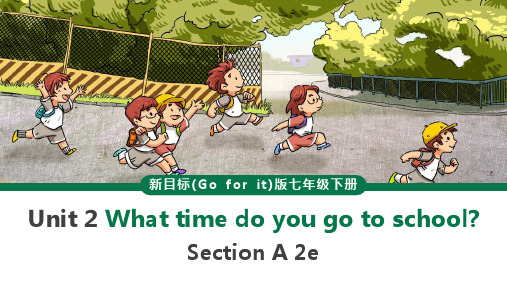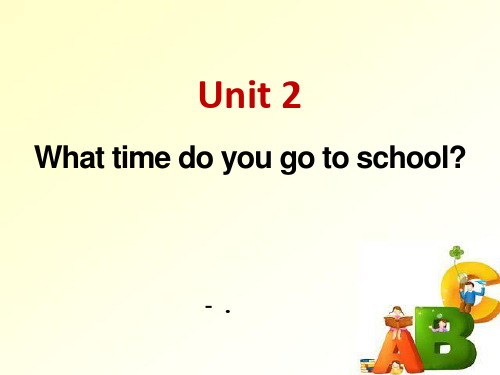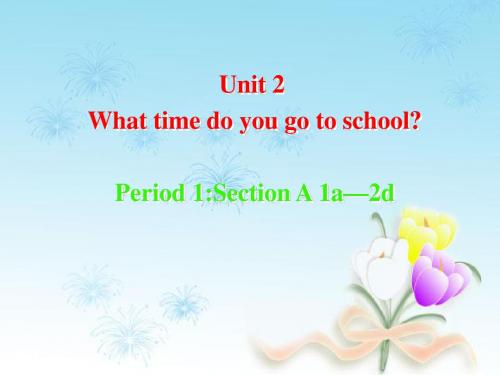人教新目标英语七下unit2《Whattimedoyougotoschool》考查训练题
- 格式:doc
- 大小:77.00 KB
- 文档页数:2

人教版新目标英语七年级下册《Unit 2 What time do you go to school》优质教学设计2一. 教材分析人教版新目标英语七年级下册《Unit 2 What time do you go to school》主要介绍了日常生活中的时间安排,包括起床、吃早餐、上学、放学、做作业、娱乐等活动。
本节课主要让学生学会询问和回答别人日常活动的时间,并能够用英语描述自己的时间安排。
教材内容贴近学生生活,有利于激发学生学习兴趣,提高学生英语表达能力。
二. 学情分析七年级的学生已经掌握了基本的英语语法和词汇,具备一定的听说读写能力。
但部分学生对英语学习仍存在恐惧心理,缺乏自信心。
此外,学生在生活中对时间的认识和安排各有不同,需要教师引导学生逐步养成良好的时间管理习惯。
三. 教学目标1.知识目标:学生能够掌握日常活动词汇,如sleep, wake up, get up,go to school等;学会用What time do you go to school?询问别人日常活动的时间,并能用英语描述自己的时间安排。
2.能力目标:学生能够听懂、会说、会读、会写日常活动相关的句子,提高英语表达能力;学会用英语询问和回答别人日常活动的时间。
3.情感目标:培养学生珍惜时间、合理安排时间的意识,养成良好的时间管理习惯。
四. 教学重难点1.重点:学生能够运用所学词汇和句型询问和回答别人日常活动的时间。
2.难点:学生能够用英语描述自己的一日生活,并在实际情景中灵活运用所学知识。
五. 教学方法1.任务型教学法:通过设定各种实际情景,让学生在完成任务的过程中运用所学知识,提高语言实际运用能力。
2.情境教学法:创设生活情境,让学生在真实的环境中感受和体验英语,激发学习兴趣。
3.激励性评价:注重鼓励学生,提高学生自信心,激发学生学习积极性。
六. 教学准备1.教材:人教版新目标英语七年级下册《Unit 2 What time do you go to school》。

Name Group ClassTitle: Unit 2 What time do you go to school? Period 1 Section A( 1a-2c )Topic: Daily routines【Get ready before class】温故知新一、Translate these numbers into English. 还记得这些数字用英文怎么表达吗?试着把它写下来。
10 15 20 2530 40 45 50二、你每天的日常活动都有哪些?把它们写下来吧。
新知探究一、根据钟表中的时间提示,用英语表达出下列时间。
二、预习课本Section A( 1a )的内容。
认真观察图片并按序号写出下列日常活动。
a.b.c.d.e.f.三、翻译:下列句子。
1. --- What time do you usually get up, Rick?--- I usually get up at six thirty.2. 你通常什么时候洗淋浴?我通常在6:40 洗淋浴.3. ---吉姆什么时候洗淋浴?---他总是在七点洗淋浴。
四、预习指南:时间表达法1. 直接表达法:1) 用“基数词 + o'clock”(o'clock可省略)表示整点。
如:eight o'clock 八点钟,ten (o'clock) 十点钟2) 用基数词按钟点+ 分钟的顺序直接写出时间。
如:eleven five 十一点过五分,six forty六点四十2. 间接表达法1) 如果分钟数少于等于30分钟,可用“分钟+ past + 钟点”表示,如:twenty past four 四点二十2) 如果分钟数多于30分钟,可用“(60分钟-原分钟数)+ to +(原钟点数+1)”表示,其中to是介词,意思是“差”。
如:8:35 twenty-five to nine注:①当分钟数是15分钟时,可用名词quarter(一刻钟)表示。




Unit 2 What time do you go to school?耿晶1. 教材分析本单元以Daily routinesand times为话题,共设计了三个部分的内容。
旨在通过单元教学使学生学会谈论日常行为、询问并答复有关时间的问题、询问并回答人们在特定时间所从事的活动。
Section A 学习谈论日常作息时间。
1a, 1b, 1c 重点学习和学生息息相关的几种日常行为的英文表示方法,学会询问和答复日常作息时间。
2a, 2b, 2c ,2d继续学习谈论自己或他人的日常作息时间。
重点学习如何询问,这也是本单元的语法重点。
3a, 3b, 3c 学会叙述他人的日常活动安排,同时学习询问时间和时间表达法,进一步巩固询问别人的日常作息时间的表达法。
Section B 继续学习询问和谈论别人的日常行为。
1a, 1b, 2a, 1c,1d,1e,学会谈论和询问一天内各个时间段的活动安排。
2a,2b,3a,3b学会通过两个人的对比介绍来判断并养成好的作息时间。
Self check 重点单词句型复习2. 课型设计与课时分配Period 1 Listening and speaking (I)(Section A: 1a, 1b, 1c)Period 2 Listening and speaking (II)(Section A:2a, 2b, 2c,2d)Period 3 Integrating skills(Section A:3a, 3b, 3cSection B: 1a, 1b,1c,1d,1e)Period 4 Reading and writing(Section B:2a, 2b, 2c,3a,3b)Period 5 Self checkⅢ. Teaching plans for each periodPeriod 1 Listening and speaking(Ⅰ) Target language目标语言1. Words && phrases生词和短语Up,get up,dress,get dressed,brush,tooth,shower,take a shower,usually,forty, what time,2. Key sentences重点句子When do people usually ...? People usually ...What time do you usually ...? I usually ...Ability goals能力目标Enable students to learn to talk about daily routines.Learning ability goals学能目标Help the students learn how to talk about daily routines.Teaching important / difficult points教学重难点How to talk about daily routines.Teaching aids教具准备A tape recorder and a model clock.Teaching procedures and ways教学过程与方式Step ⅠWarming upIn this procedure, motivate students to learn some words and phrases by singing the songs they’ve learned before.T: Good morning, everyone. (sing) “Good morning to you. Good morning to you. Good morning, dear children. Good morning to you.” This song is easy to learn. Who can sing it to us?Encourage students to sing the song.T: Well done. Thank you! We sing “Good morning to you” in the morning. Then what do we sing in the afternoon and in the evening? S: We sing Good afternoon to you in the afternoon and Good evening to you in the evening.T: That’s right. I know all of you are very good at singing. Does anyone want to sing Good afternoon to you or Good evening to you to us?Step ⅡTalking and reading (1a)In this procedure, ask students to finish the required task and learn some key phrases about daily actions.T: As we all know, time is very important and in English there is a famous saying "An hour in the morning is worth two in the evening." So what do you do in the morning?S1: I read English. S2: I do morning exercise.T: And what do you do in the afternoon and in the evening?S1: I play basketball in the afternoon. S2: I watch TV in the evening.T: I’m very glad to hear that. You use your time very well. And there’re many daily things we can do. Now let’s read these phrases in 1a and match these actions and the time of day.Step ⅢPracticeIn this procedure, students will learn how to talk about actions and the time of day.T: I know you’re very clever. Now I want you to tell if my statements are right or wrong. First, I usually eat dinner in the morning. S: Wrong.T: When do I usually eat dinner? S: In the evening.T: Second, she gets up at 19:00 in the morning. S: Wrong.T: What is the correct way of saying the sentence? S: She gets up at 7:00 in the morning.T: How clever you are! Now let’s read the conversation in groups and see which group reads better.Ask students to do pairwork.T: Please ask your partner when people usually do these things: do homework, eat dinner, eat breakfast and go to bed.(Write “When do people usually ...”on the blackboard)Sample dialogue:S1: When do people usually do homework?S2: People usually do homework in the afternoon.Interest the students in going on practicing the conversation using a new way of reading.T: Now let’s try a new way of reading. First I name one student to ask a question, and then ask all of you repeat this question together. After that, I name another student to answer this question, and all of you repeat the answer together.Sample dialogue:S1: When do people usually go to bed?S: When do people usually go to bed?S2: People usually go to bed in the evening.S: People usually go to bed in the evening.Step ⅣTalking about time (1c)In this procedure, students will learn how to ask about and say hour times and learn some key phrases about daily routines.T: Boys and girls, please listen to what I’m saying and guess what it is. 小小骏马不停蹄,日日夜夜不休息,蹄声哒哒似战鼓,提醒人们争朝夕。
人教版新目标英语七年级下册《Unit 2 What time do you go to school》教学设计3一. 教材分析人教版新目标英语七年级下册《Unit 2 What time do you go to school》主要围绕着日常生活中的时间安排展开。
本节课通过学习不同的时间表达方式,使学生能够灵活运用英语询问和描述日常作息时间。
教材内容丰富,包括对话、词汇、语法及任务型活动等,旨在培养学生的听说读写技能,提高他们的语言运用能力。
二. 学情分析七年级的学生已经掌握了基本的英语语法和词汇,具备一定的听说读写能力。
他们对新知识充满好奇心,善于模仿和交流。
但同时,部分学生可能对时间表达方式的掌握还不够熟练,需要教师的引导和练习。
三. 教学目标1.知识目标:学生能够掌握日常时间表达方式,如“What time do yougo to school?”、“I go to school at 7:00.”等;2.能力目标:学生能够在实际情境中运用英语询问和描述时间;3.情感目标:培养学生珍惜时间、合理安排作息的良好习惯。
四. 教学重难点1.重点:学生能够正确使用时间表达方式进行问答;2.难点:学生能够在实际情境中灵活运用时间表达方式。
五. 教学方法1.情境教学法:通过设定真实的生活情境,让学生在实际交流中学会运用时间表达方式;2.任务型教学法:设计各种任务活动,让学生在完成任务的过程中提高语言运用能力;3.互动式教学法:引导学生积极参与课堂互动,增强学生的自信心和合作精神。
六. 教学准备1.准备教材、课件和教学资源;2.设计相关任务活动和练习题;3.准备时间表、闹钟等教具。
七. 教学过程1.导入(5分钟)利用多媒体展示不同的时间场景,如早晨起床、上学、放学等,引导学生用英语描述这些场景。
2.呈现(10分钟)教师展示教材中的对话,让学生边听边跟读,掌握日常时间表达方式。
同时,教授时间词汇如“morning”、“afternoon”、“evening”等。
Unit 2 What time do you go to school?1. Teaching Aims:1) Aims of Basic Knowledge:① Vocabulary: time, shower, usually, O’clock, what time, go to school, takea shower.② Grammar: What time do you…? What time does he / she…?③ Function: Use the simple ten se to talk about the daily life.2) Aims of Abilities: Listening skill. Speaking skill. Reading skill. W riting skill.3) Aims of Emotion: Love life.2. Analysis of the Material:1) Brief Introduction of the teaching material:What time / When do you…?” “What time / When does he…?”2) Teaching Focus: What time do you…? What time does he/she…?3) Teaching D ifficulties: Present tense.3. Learning Methods: Make a plan. Culture.4. Teaching Methods: Student- centered. Task-based Teaching.5. Teaching Time: 4 periodsPeriod 1(Section A: 1a-2a)Step One: Warming-upGreetingT: Good afternoon, everyone.Ss: Good afternoon, Miss Yang.Step Two: Presentation1.Adjust the time, and ask students questions.T: What time is it? Ss: It’s 12 o’clock. ( Write on Bb )( Help Ss to say )T: What time is it? Ss: It’s 10:15. ( Help Ss to say )2.Ask one student to come to the front, adjust the time and ask the otherstudents.S1: What tim e is it? Ss: It’s 9 o’clock.3.Teach the new words & phrases.Show some pictures of different clocks and the activities.T: I’m very busy these days. Can you guess what time I get up / eat breakfast /go to school / run / take a shower? ( Write on Bb)T: I usually get up at 6:35. ( Teach Ss the new word “ usually” )S1: You us ually eat breakfast at …S2: You usually run at…S3: You usually take a shower at …4.Ask Ss to do the exercise of 1a, and then check the answers.Step Three: Listening1.Show Ss the timetable of Rick’s ( w rite o n small Bb )Rick’s timetableGets upEats breakf astRunsGoes to schoolTakes a showerAsk Ss listen to the recorder and fill in the chart.Then check the answers.2.Ask and answer.T: What time does Rick get up / eat breakfast / run / go to scho ol / take a shower ?Ss: He gets up / eats breakfast / runs / goes to school / takes a shower at…( Ask Ss pay attention to the underlined phrases.)Step Four: Consolidation1.Ask Ss to look at the pictures and tell their days.Example: I usually get up at …. I eat breakfast at …. I go to school at …. At …,I take a shower.Step Six: Homework1.Try to remember all the words & phrases.2.Survey: Ask your classmates their routines, and give your report.3.Plan: January 1st is coming. Please plan it, and make your day wonderful.Step Seven Blackboard DesignUnit 2What time do you goWhat time do you go to schoolgo to school get dressedeat breakfast take a shower Reflection after class:。
UNIT 2 What time do you go to school?Section A 第1课时(1a~1c)自主学习方案1. 自学生词,并记住拼读及拼写。
2. 预习课本找出重点短语及句子。
(见学案自学导练内容)3. 读记后完成自学导练内容。
课堂导学方案Step1 情景导入利用图片或多媒体给学生展示时间,教师问:What time is it? Can you tell me?Let’s learn how to say time in English.教师可以自己回答一、两个时间,然后让学生回答。
—What time is it?—It,s two (o’clock)/two twenty.环节说明:开门见山的提出本节课的学习重点—时间表达法。
Step 2完成教材1a—1c的任务1. 教师领读1a中的词组,学生识记并且将活动和图片中的人物匹配。
(3分钟)2. 以小组为单位说出1a图片上时钟显示的时间,练习时间表达方法。
(3分钟)3. 认真听录音,将所进行的活动和时间相匹配。
完成课本1b的听力任务。
(2分钟)4. 再听一遍录音,并跟读,模仿语言语调。
(2分钟)5. 仿照1c中的对话,利用1b的听力信息和同伴练习新对话,并邀请几组同学来表演对话。
(5分钟)参考案例:6.小结训练。
(5分钟)(1)我早上六点起床。
I get up at six in the morning.(2)他的爸爸晚上九点洗澡。
His father takes a shower at nine in the evening.(3)你姐姐几点刷牙?What time does your sister brush teeth?(4)写出下列时间。
8:00 eight (o’clock)9:02 nine off two11:25 eleven twenty—five环节说明:听说结合,第一时间向学生传达语言目标,通过结对对话练习和小结训练,语言目标得以强化。
unit2 What time do you go to school考查主题:1、Unit2 相关知识点及内容2、完成知识目标的构建,总结及反思考查形式:封闭式检测训练不指导、不讨论、不抄袭(独立完成40min、互批20min)板块一: 训练主题:单选题的训练(20分)()1.--- ?--- It's nine thirty.A.What's itB.What time is itC.What day is it ( ) 2. Sunday, Jack's brother usually gets up eight o'clock. A.At,on B.In, on C.On,at( ) 3.I like my sister Lisa.She helps do homework.A.me,myB.my,meC.me,I( ) 4.She goes work after breakfast every day.A./;toB.the;aC.to;/( ) 5.---Do you have a ?---Yes,I do.I in a big shop.A.job;workB.work; workC.work;job( ) 6.We go to school Monday Friday.A.on; andB.on,toC.from,to( ) 7.---Can you me your telephone number?---Yes,it's 578-0285A.tellB.sayC.speak( ) 8.He is very tired(累) after work, so he early.A.plays sportsB.gets upC.goes to bed( ) 9.---- do your parents have lunch?---At home.A.WhatB.WhenC.Where( ) 10.My father home at 5:00 pm in the afternoon.A.getsB.gets toC. get to( ) 11.---Excuse me,What's the English for English for "7:58"? ---It'sA.two past eightB.two to eightC.fifty-eight past one12.That's a funny time swimming.A.toB.withC.for13.The food on the table good.A.eatsB.hasC.tastes14.Either you or she good with old people.A.beB.isC.are15.In our school,we usually at 7:00 in the morning.A.do exerciseB.do morning exerciseC.do morning exercises16.Tom eat breakfast at school.A.doesn't usuallyually doesn'tC.don't usually17.She usually her homework school.A.do,atB.does,inC.does,at18.He always clean room on Saturday.A.one'sB.hisC.he19.--- does Mary take a walk?--- In the morning on Sunday.A.WhenB.What timeC.What about20.His brother doesn't TV in the evening.A.watchB.watchsC.watches总结反思:1、基础掌握(□我会,□我不会)2、我有下面的问题想与老师或组员交流:;板块二:训练主题:综合运用(40分)一、短语大闯关(10分)1.起床2.上学3.穿衣4.刷牙5.吃早餐6.洗澡7.做作业 8.睡觉 9.散步10.进行体育活动二、词汇运用(10分)A)根据句意及汉语提示完成单词(5')。
1.In this (组),you can only see one boy.2.Li xing is my (最好的)friend.3.---Do you like relaxing (生活)?---Yes,I do。
4.Tom has thirty-two (牙齿),but I only have twenty-eight5.Linda is a good student.She (从不)plays computers game.B)根据句意,选择方框中的单词并用其适当形式填空(5')。
take ,early,brush,quick,clean1.Bob gets up and then goes to school.2.My brother his shoes on the weekend.3.I don't have time to my room from Monday to Friday.4.I am very healthy. I always a walk after dinner.5.Sometimes I get up late,so I eat breakfast .三.句子运用(20分)A) 根据汉语意思完成句子(10')。
1.你早上什么时间洗澡?What time do you in the morning?2.今天你迟到了吗?you school today?3.我有时候打半个小时的篮球。
I sometimes play basketball .4.吃蔬菜对我们的健康有好处。
Eating vegetables our health.5.你有一个健康的饮食习惯吗?Do you have a eating ?B)句型转换(10')。
1.His mother eats lunch at one o'clock.(改为否定句)His mother lunch at one o'clock.2.My sister usually goes to bed at eight thirty.(对划线部分提问)does your sister usually go to bed?3.Tim eats dinner at seven o'clock.(对划线部分提问)dinner at seven o'clock?4.Mary goes to school at 7:00 evening morning.(改为一般疑问句)Mary to school at 7:00 evening morning?5.They usually eat dinner at six forty-five (改为同义句)They usually eat dinner at .总结反思:1、单词掌握(□我会,□我不会)2、我有下面的问题想与老师或组员交流:板块三:训练主题:完形填空(20分)Hi,Alan,Thank you for your help lat time.Today let me tell you about my school 1 .In the morning I get up at six ten.After that I 2 my teeth. At about seven o'clock.I eat 3 .Then I go to school. I usually get to school at about seven forty. And I never late 4 school.At eight o'clock,classes2板块四:训练主题:文章理解(20分)AMy name is Joe. I’m in the Chinese club at our school. But I like music very much. I want to join the music club.Lisa and Linda are my friends. Lisa likes playing chess. She wants to join the chess club. Do you know what Linda likes? Oh, she likes sports and she likes swimming very much. She swims well, but she doesn’t want to join the swimming club. She wants to join the music club and learn about music.David is also my friend. He likes English. He wants to join the English club and learn English. ( ) 1. What does Joe like?A. MusicB. Playing chessC. EnglishD. Swimming( ) 2. Lisa and Linda are Joe’s __________.A. sistersB. friendsC. cousinsD. aunts( ) 3. What club does Lisa want to join?A. The music clubB. The chess clubC. The swimming clubD. The Chinese club ( ) 4. Who wants to join the English club?A. JoeB. LisaC. LindaD. David( ) 5. Which is RIGHT?A. Lisa swims wellB. Joe is in the music clubC. David wants to learnD. Linda wants to learn swimmingBTony and Anna are brother and sister. They are Americans. Tony likes sports very much. He can play soccer, basketball and volleyball. Anna likes music very much. She can’t play ball games. But they both like playing on computers.They like eggs bread and milk for breakfast. For lunch, Anna likes eating vegetable and fruit, but Tony likes chicken and fish. They both like hamburgers. But they don’t like ice-cream or dessert. ( ) 1. Ann a is Tony’s ________ and they are _______.A. sister; ChineseB. sister; AmericansC. friend; AmericansD. friend; Chinese( ) 2. Tony likes ______ and he can play _________.A. sports; tennisB. music; basketballC. sports; volleyballD. music; baseball( ) 3. Tony and Anna both like _________A. vegetablesB. soccerC. playing on computerD. fish ( ) 4. For breakfast, they like _________.A. eggs, bread and milkB. vegetables and fruitC. chicken and fishD. hamburgers and ice-cream( ) 5. They don’t like _______ or _______.A. ice-cream; vegetablesB. ice-cream; dessertC. hamburgers; dessertD. milk; bread总结反思:1.文章内容掌握(□我会,□我不会)2、我有下面的问题想与老师或组员交流:;。